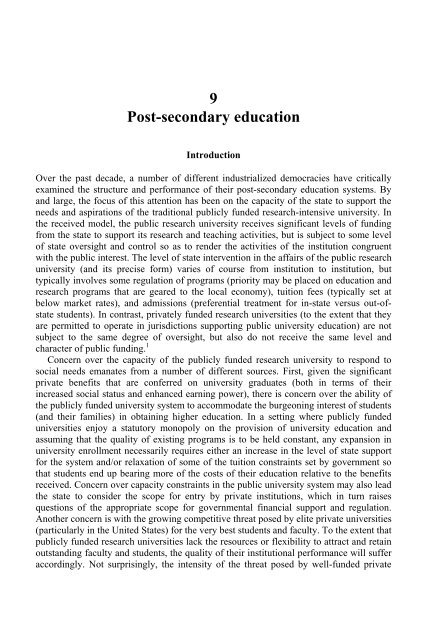Rethinking the Welfare State: The prospects for ... - e-Library
Rethinking the Welfare State: The prospects for ... - e-Library
Rethinking the Welfare State: The prospects for ... - e-Library
Create successful ePaper yourself
Turn your PDF publications into a flip-book with our unique Google optimized e-Paper software.
9<br />
Post-secondary education<br />
Introduction<br />
Over <strong>the</strong> past decade, a number of different industrialized democracies have critically<br />
examined <strong>the</strong> structure and per<strong>for</strong>mance of <strong>the</strong>ir post-secondary education systems. By<br />
and large, <strong>the</strong> focus of this attention has been on <strong>the</strong> capacity of <strong>the</strong> state to support <strong>the</strong><br />
needs and aspirations of <strong>the</strong> traditional publicly funded research-intensive university. In<br />
<strong>the</strong> received model, <strong>the</strong> public research university receives significant levels of funding<br />
from <strong>the</strong> state to support its research and teaching activities, but is subject to some level<br />
of state oversight and control so as to render <strong>the</strong> activities of <strong>the</strong> institution congruent<br />
with <strong>the</strong> public interest. <strong>The</strong> level of state intervention in <strong>the</strong> affairs of <strong>the</strong> public research<br />
university (and its precise <strong>for</strong>m) varies of course from institution to institution, but<br />
typically involves some regulation of programs (priority may be placed on education and<br />
research programs that are geared to <strong>the</strong> local economy), tuition fees (typically set at<br />
below market rates), and admissions (preferential treatment <strong>for</strong> in-state versus out-ofstate<br />
students). In contrast, privately funded research universities (to <strong>the</strong> extent that <strong>the</strong>y<br />
are permitted to operate in jurisdictions supporting public university education) are not<br />
subject to <strong>the</strong> same degree of oversight, but also do not receive <strong>the</strong> same level and<br />
character of public funding. 1<br />
Concern over <strong>the</strong> capacity of <strong>the</strong> publicly funded research university to respond to<br />
social needs emanates from a number of different sources. First, given <strong>the</strong> significant<br />
private benefits that are conferred on university graduates (both in terms of <strong>the</strong>ir<br />
increased social status and enhanced earning power), <strong>the</strong>re is concern over <strong>the</strong> ability of<br />
<strong>the</strong> publicly funded university system to accommodate <strong>the</strong> burgeoning interest of students<br />
(and <strong>the</strong>ir families) in obtaining higher education. In a setting where publicly funded<br />
universities enjoy a statutory monopoly on <strong>the</strong> provision of university education and<br />
assuming that <strong>the</strong> quality of existing programs is to be held constant, any expansion in<br />
university enrollment necessarily requires ei<strong>the</strong>r an increase in <strong>the</strong> level of state support<br />
<strong>for</strong> <strong>the</strong> system and/or relaxation of some of <strong>the</strong> tuition constraints set by government so<br />
that students end up bearing more of <strong>the</strong> costs of <strong>the</strong>ir education relative to <strong>the</strong> benefits<br />
received. Concern over capacity constraints in <strong>the</strong> public university system may also lead<br />
<strong>the</strong> state to consider <strong>the</strong> scope <strong>for</strong> entry by private institutions, which in turn raises<br />
questions of <strong>the</strong> appropriate scope <strong>for</strong> governmental financial support and regulation.<br />
Ano<strong>the</strong>r concern is with <strong>the</strong> growing competitive threat posed by elite private universities<br />
(particularly in <strong>the</strong> United <strong>State</strong>s) <strong>for</strong> <strong>the</strong> very best students and faculty. To <strong>the</strong> extent that<br />
publicly funded research universities lack <strong>the</strong> resources or flexibility to attract and retain<br />
outstanding faculty and students, <strong>the</strong> quality of <strong>the</strong>ir institutional per<strong>for</strong>mance will suffer<br />
accordingly. Not surprisingly, <strong>the</strong> intensity of <strong>the</strong> threat posed by well-funded private


